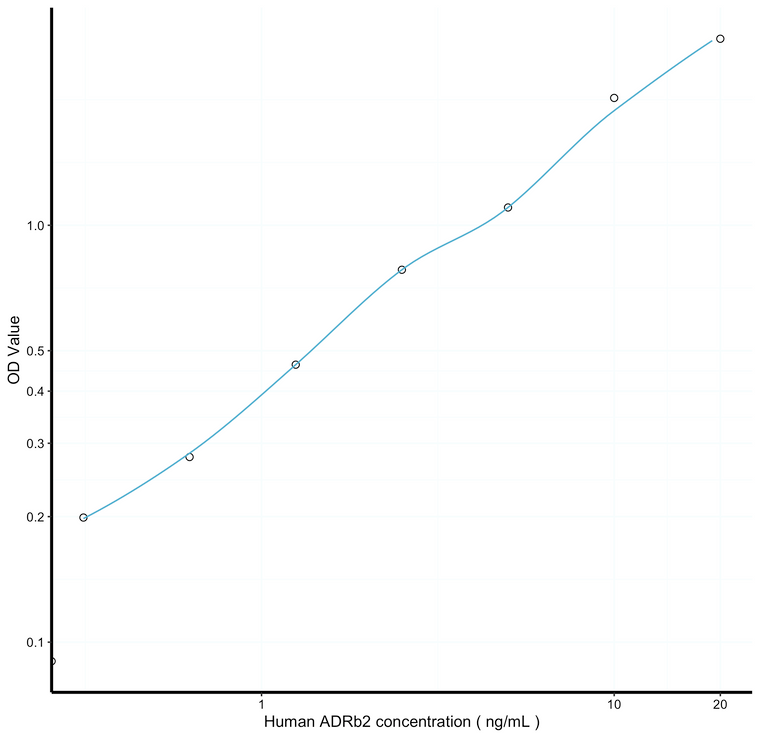| Applications: |
ELISA |
| Reactivity: |
Human |
| Note: |
STRICTLY FOR FURTHER SCIENTIFIC RESEARCH USE ONLY (RUO). MUST NOT TO BE USED IN DIAGNOSTIC OR THERAPEUTIC APPLICATIONS. |
| Sensitivity: |
0.114ng/mL |
| Detection Limit: |
0.312-20ng/mL |
| Short Description: |
This ADRb2 Sandwich ELISA Kit is an in-vitro enzyme-linked immunosorbent assay for the measurement of samples in human cell culture supernatant, serum and plasma (EDTA, citrate, heparin). |
| Storage Instruction: |
Store the unopened kit in the fridge at 2-8°C for up to 6 months. Once opened store individual kit contents according to components table provided with the kit. |
| Assay Time: |
4.5 hrs |
| Gene Symbol: |
ADRB2 |
| Gene ID: |
154 |
| Uniprot ID: |
ADRB2_HUMAN |
| Sample Type: |
serum, plasma, tissue homogenates or other biological fluids. |
| Tissue Specificity | |
| Post Translational Modifications | Palmitoylated. Mainly palmitoylated at Cys-341. Palmitoylation may reduce accessibility of phosphorylation sites by anchoring the receptor to the plasma membrane. Agonist stimulation promotes depalmitoylation and further allows Ser-345 and Ser-346 phosphorylation. Also undergoes transient, ligand-induced palmitoylation at Cys-265 probably by ZDHHC9, ZDHHC14 and ZDHHC18 within the Golgi. Palmitoylation at Cys-265 requires phosphorylation by PKA and receptor internalization and stabilizes the receptor. Could be depalmitoylated by LYPLA1 at the plasma membrane. Phosphorylated by PKA and BARK upon agonist stimulation, which mediates homologous desensitization of the receptor. PKA-mediated phosphorylation seems to facilitate phosphorylation by BARK. Phosphorylation of Tyr-141 is induced by insulin and leads to supersensitization of the receptor. Polyubiquitinated. Agonist-induced ubiquitination leads to sort internalized receptors to the lysosomes for degradation. Deubiquitination by USP20 and USP33, leads to ADRB2 recycling and resensitization after prolonged agonist stimulation. USP20 and USP33 are constitutively associated and are dissociated immediately after agonist stimulation. Ubiquitination by the VHL-E3 ligase complex is oxygen-dependent. Hydroxylation by EGLN3 occurs only under normoxia and increases the interaction with VHL and the subsequent ubiquitination and degradation of ADRB2. |
| Function | Beta-adrenergic receptors mediate the catecholamine-induced activation of adenylate cyclase through the action of G proteins. The beta-2-adrenergic receptor binds epinephrine with an approximately 30-fold greater affinity than it does norepinephrine. |
| Protein Name | Beta-2 Adrenergic ReceptorBeta-2 AdrenoreceptorBeta-2 Adrenoceptor |
| Database Links | Reactome: R-HSA-390696Reactome: R-HSA-418555Reactome: R-HSA-5689880Reactome: R-HSA-8856825Reactome: R-HSA-8856828 |
| Cellular Localisation | Cell MembraneMulti-Pass Membrane ProteinEarly EndosomeGolgi ApparatusColocalizes With Vhl At The Cell MembraneActivated Receptors Are Internalized Into Endosomes Prior To Their Degradation In LysosomesActivated Receptors Are Also Detected Within The Golgi Apparatus |
| Alternative ELISA Names | Beta-2 Adrenergic Receptor ELISA kitBeta-2 Adrenoreceptor ELISA kitBeta-2 Adrenoceptor ELISA kitADRB2 ELISA kitADRB2R ELISA kitB2AR ELISA kit |
| output | |
Information sourced from Uniprot.org
12 months for antibodies. 6 months for ELISA Kits. Please see website T&Cs for further guidance







